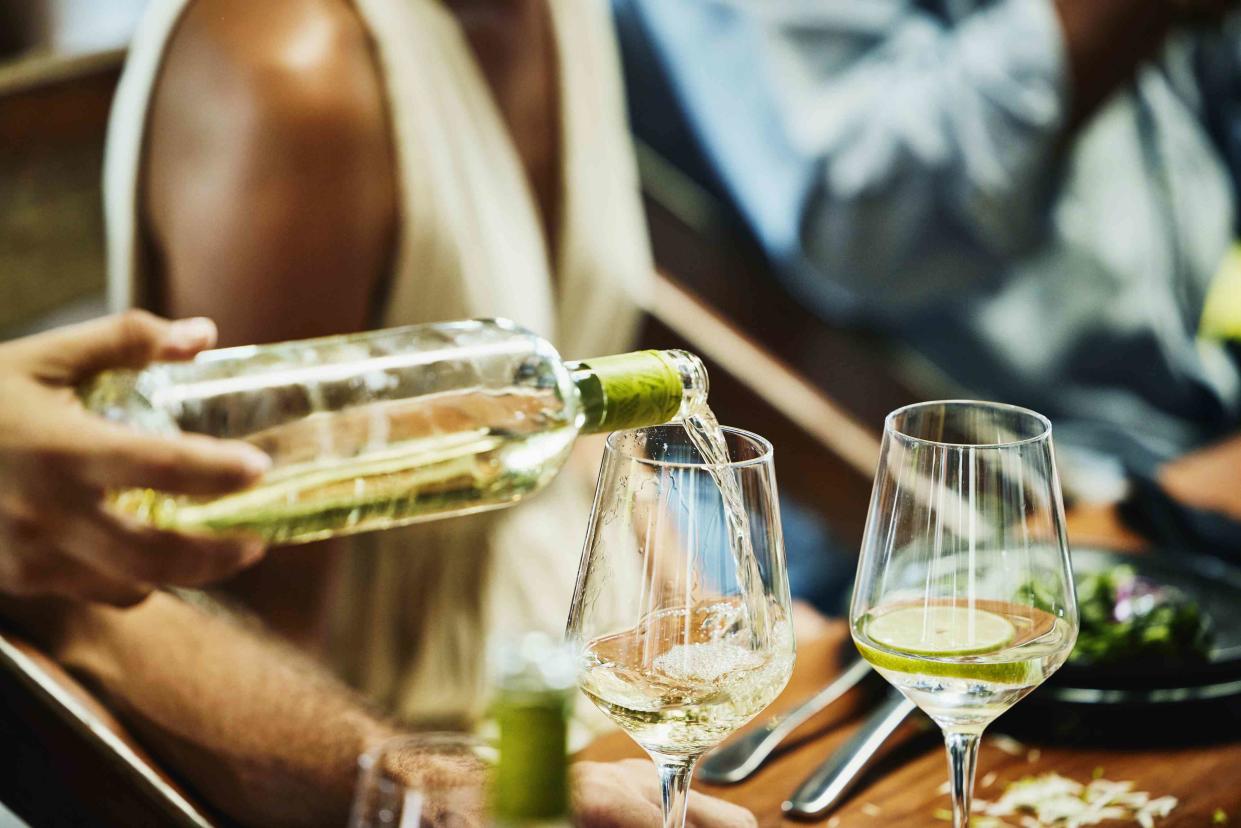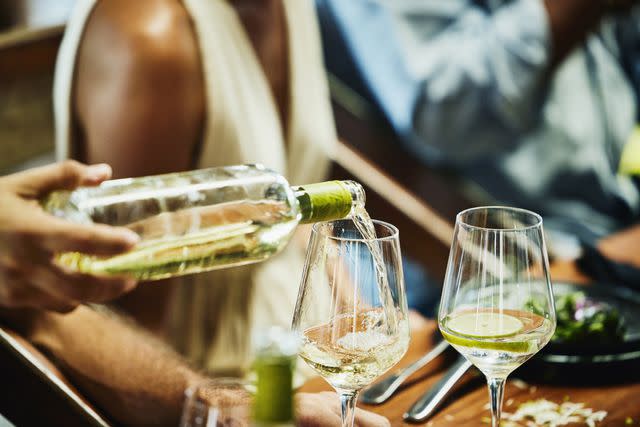Is Alcohol Safe With Diverticulosis or Diverticulitis?

Thomas Barwick / Getty Images
Medically reviewed by Sonal Kumar
Diverticula are small pouches that form in the large intestine (colon) that bulge outward. People with these intestinal pouches have a condition called diverticulosis. "Diverticulitis" is the term used for when the pockets become inflamed or infected. These conditions are both referred to as "diverticular disease" and there is conflicting research on how alcohol impacts them.
is greatly impacted by diet, and there is conflicting research on the effects alcohol has on it.
This article aims to explain the connection between alcohol and diverticular disease.

Thomas Barwick / Getty Images
Does Alcohol Cause Diverticular Disease?
Some research suggests that alcohol intake can cause or trigger diverticular disease. However, the data are inconsistent.
Some studies show a significantly increased risk of diverticulosis in people who drink alcohol. Although experts don't know precisely why this is so, some speculate it may be because alcohol causes dehydration. In turn, dehydration can cause hard stools and increased straining during bowel movements, increasing the risk of diverticular formation.
Alcohol may also slow intestinal motility, leading to constipation and increased pressure in the intestines.
Standard Research Study Terms:
Cause: An agent known to produce an effect or result
Risk factor: An agent that increases the chance of developing a disease or having a negative outcome
Association: A statistical relationship between two variables
It is important to talk with your healthcare provider about your individual risk factors and any lifestyle changes that may help reduce your risk of developing diverticular disease.
Other Risk Factors
Although it is not clear exactly why intestinal pouches form, there are risk factors that may increase the presence of diverticula, including:
Eating a low-fiber diet
Lack of exercise
Having obesity
Advanced age
Smoking
Medications, such as nonsteroidal anti-inflammatory drugs (NSAIDs)
Genetics
Diverticulosis is not uncommon in people younger than 40 but is relatively common in older adults. About half of Americans over age 60 have this condition, and most people will have it by age 80. Some foods once considered harmful, such as popcorn and nuts, do not appear to lead to inflammation of the pouches.
Evidence from several studies shows that daily dietary fiber intake reduces the risk of diverticular disease. One 2020 meta-analysis of five cohort studies and a total of 865,829 participants found that those who consumed 30 grams of fiber per day had a 41% reduction in risk compared to those with a low fiber intake.
Soluble Fiber vs. Insoluble Fiber
Soluble fiber: Absorbs water and turns to gel during digestion, which slows digestion
Insoluble fiber: Adds bulk to the stool and can help food pass quickly through the stomach and intestines
How Does Alcohol Affect Diverticulitis?
Alcohol may lead to gastric irritation and trigger diverticulitis symptoms. Consumption of alcohol may also increase the frequency of flare-ups. Talk to your healthcare provider if you have diverticulitis symptoms. They may advise you to avoid alcohol completely to prevent the condition from worsening. It's generally best to avoid alcohol during episodes of diverticulitis.
Mild Diverticulitis
Diverticulitis occurs if the pouches become inflamed or infected. Mild diverticulitis symptoms include:
Mild cramps
Bloating
Eating a high-fiber diet and taking a mild pain reliever will often relieve mild diverticulitis symptoms.
Common symptoms of more severe diverticulitis include:
Abdominal pain (usually on the left side)
Constipation
Cramping
Fever
Nausea
Vomiting
Chills
Extreme symptoms of diverticulitis include bleeding or blockages. Your healthcare provider may need to perform diagnostic testing, such as computed tomography (CT) or magnetic resonance imaging (MRI), to diagnose diverticulitis.
Treatment may include:
Antibiotics
Pain relievers
A liquid diet
Severe diverticulitis cases may require hospitalization or surgery.
Effect on Diverticulosis
Some people may wonder if it is OK to occasionally drink with diverticulitis. Studies have found that older age and drinking alcohol are the most identifiable risk factors for developing diverticulosis. The researchers noted that lifestyle changes, including avoiding alcohol, may decrease the risk of developing diverticular disease.
Chronic Diverticulitis
Chronic diverticulitis refers to the following:
Repeated attacks of diverticulitis
Prolonged diverticulitis attacks
Complications from prolonged diverticulitis such as intestinal strictures, fistulas, or diverticular sacs that bleed
Sometimes chronic diverticulitis can cause a small amount of blood in the stool. Bleeding may also be severe and include the passage of dark blood clots.
If you have rectal bleeding, even a minor amount, contact your healthcare provider right away. Diverticular bleeding may stop on its own without treatment. In severe cases, diverticular bleeding may require a hospital stay and treatment such as a colonoscopy, angiogram, or surgery to stop the bleeding.
Alcohol Misuse in Diverticulitis Patients
Although there is insufficient data on the association between alcohol consumption and diverticular disease, studies show that alcohol intoxication is a potential risk factor for the disease.
It is well-documented that too much alcohol, either over a long period or all at once, can cause serious physical and mental health problems. Even drinking too much on a single occasion hampers your body’s ability to ward off infections 24 hours later.
One 2020 study found that the risk of diverticular disease was higher in patients with alcohol intoxication or overuse and was especially high higher in male patients 45 years of age or higher.
Worst Alcohol for Diverticulitis
Ethyl alcohol is the intoxicating ingredient in alcoholic beverages. Beer, wine, and hard liquor all contain it. If you do decide to drink alcohol, consider the alcohol content in your beverage.
Alcohol by volume (ABV) is a metric used to determine a beverage's alcoholic content. ABV shows what percentage of the beverage’s total volume is pure alcohol.
A Standard Drink in the United States
In the United States, one drink contains about 14 grams of pure alcohol, which is found in:
12 ounces of beer: 5% ABV content
5 ounces of wine: 12% ABV content
1.5 ounces or a "shot" of distilled spirits or liquor: 40% ABV content
Which Alcohol Is “Best”?
There is no "best" alcohol to prevent diverticular disease, and the safest route is not to drink at all. However, if you drink, it is very important to recognize exactly how much alcohol you are drinking. Liquor typically contains more alcohol by volume than wine or beer, meaning you need less of it for your body to feel its effects.
Cutting Back or Quitting Drinking With Diverticular Disease
If you find that drinking has gotten in the way of daily activities, your health, relationships, or work or social life, it may be time to make an alcohol-free lifestyle change.
The first step is becoming aware that it is time to cut back or stop drinking alcohol completely. This may take some time. Talk to your healthcare provider about your drinking habit and its impact on your life. Your provider can discuss your specific risk factors and the benefits of quitting alcohol and help you find a treatment plan that works best for you.
Also, talk to your provider about your risk of alcohol withdrawal symptoms if you were to stop drinking suddenly. If they determine you are, you may need to stay under medical care or observation while you quit.
Summary
Some research studies show a significantly increased risk of diverticulosis in people who drink alcohol. Some experts speculate it may be because alcohol causes dehydration, which can cause hard stools and increased straining during bowel movements, increasing the risk of diverticular formation. Alcohol may also slow intestinal motility, leading to constipation and increased pressure in the intestines.
Other risk factors may include eating a low-fiber diet, lack of exercise, obesity, smoking, and older age. There is no "safe" amount of alcohol to prevent diverticular disease. The safest route is not to drink any at all. Talk with your healthcare provider about your risk factors. You may also consider discussing any lifestyle changes you want to make to lower your alcohol consumption and reduce your risk of developing diverticular disease.

